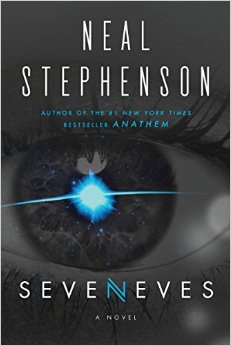Matthew Kresal jumps into the future, and into the pages of Seveneves...
What would happen if the world was ending?
That question, on the inside of the dust jacket, lies at the heart of Neal Stephenson's latest novel Seveneves. Stephenson, best known for novels like Cryptonomicon, takes a familiar premise of apocalypse coming from the sky and combines it with a firm grounding in modern and near future space technologies. The result is a finely crafted, densely layered and epic vision crammed into 867 pages.
Going into this, it's probably worth noting that Seveneves isn't really one novel structurally speaking. It is, in fact, two novels in one. The first novel, taking up the first 560 odd pages, sets up and then answers that initial question. Following the destruction of the Moon by an unknown “agent” that breaks it apart, a realization slowly dawns on the world's scientists and governments that the end of the world as we know it will soon be upon us. A race against time begins, not to try to prevent it but to make certain that something of humanity and our world survives what comes to be called “the Hard Rain.” The narrative here shifts back and forth initially between those on Earth (including an astronomer and popularizer of science clearly modeled on Neil deGrasse Tyson and the female President of the United States) and the crew of the International Space Station. For those such as myself who have a strong interest in space exploration and where it might take us in the near future, this is perhaps the most fascinating section of the novel as humanity races against the clock to turn the ISS (or Izzy as it becomes known) into a functioning, self-sustaining orbital colony, despite challenges and setbacks ranging from personal to technical and the political.
Once the Hard Rain starts, the narrative shifts gears. With humanity's only survivors now floating in orbit trying to stay alive, struggles begin within its large population with competing visions of humanity's future in mind. This section works well at first, and indeed for much of the two hundred odd pages it covers, despite a couple of improbable plot twists, including one that sees a most unlikely person making their way onto the Cloud Ark and stirring things up. Stephenson gets into some fascinating discussions of human nature in this section as, despite the divisions, plans are made for long term survival. Where this section gets bogged down is towards the end, where, with characters exiting almost continuously before suddenly jumping three years into the future, the rest of the section becoming a long, continuous info dump that finally gives the rather odd title context. On the whole though, it works, and could have been a mostly satisfying ending for the novel except that Stephenson doesn't stop there.
Where Seveneves really becomes two novels in one is in its last three hundred pages or so. The narrative rather suddenly jumps five thousand years in the future to let us see the aftermath of events. It's a complete and total shift in both tone and setting and not one that benefits either the book or the reader. This look at all the implications involved for humanity having been in space for so long ought to be fascinating, and sometimes is, but it also means that this section gets off to a very slow start as it effectively has to restart the novel all over again and gets bogged down for another fifty pages or more in info dump mode. Once it moves beyond that, it never quite recovers either pace nor the reader's interest despite some wonderful moments that pick up on threads that have laid dormant in the narrative for hundreds of pages (and thousands of years) by that point. Given how much building and rebuilding of a world it has to do (both literally and figuratively), one can't help but feel that both this book and this section of it in particular would have been better served as its own separate sequel novel rather than feeling tacked onto it.
Despite the narrative being hurt considerably by this last section, Seveneves is still something of a triumph. It's a sweeping vision of the end of our civilization, and our world, as we know it and how we might try to ensure that something of it survives. This isn't for the crowd raised on something like Armageddon, with its absurd science and its lowest common denominator sensibilities. This is a more serious, epic, realistic and at times frustrating look at “survival of the fittest”, human nature and why we ought to be taking space exploration more seriously. Our future, it suggests, could well depend on what we do beyond our world.
Matthew Kresal lives in North Alabama where he's a nerd, doesn't
have a southern accent and isn't a Republican. He's a host of both the
Big Finish centric Stories From The Vortex podcast and the 20mb Doctor Who Podcast. You can read more of his writing at his blog and at The Terrible Zodin fanzine, amongst other places.
Post Top Ad
Tags
# Books
# Matthew Kresal
# Print
# Review
# Seveneves
Seveneves
Labels:
Books,
Matthew Kresal,
Print,
Review,
Seveneves
Subscribe to:
Post Comments (Atom)



























No comments:
Post a Comment